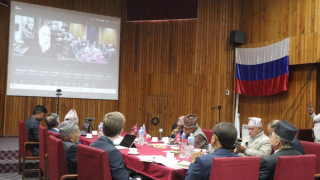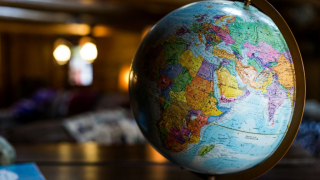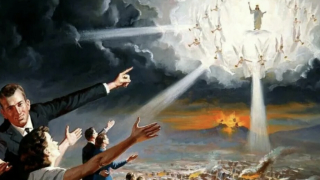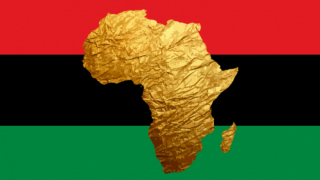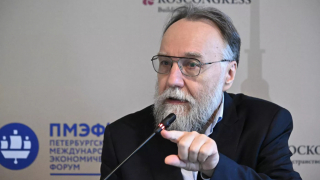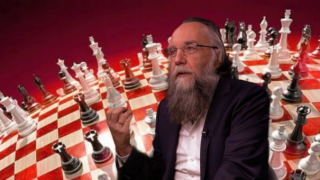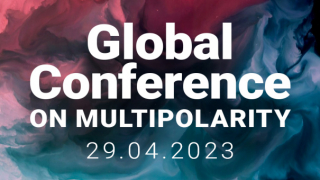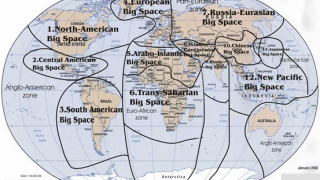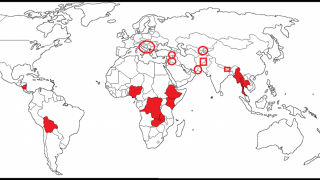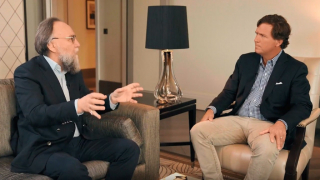Romania, between globalist integration and multi-polar partnership
The situation of Romania before 1989 and today
Romania is a former communist country and currently, for about 15 years, is included in Euro-Atlantic integration. In order to reflect Romania’s situation today, I would like to first take a brief look at the comparison between the current state of facts and the one before the so-called „revolution”, which brought us liberalization, privatization, progressivism and the general orientation on the line of globalization. In essence, I think one can say that in these 30 years we have passed from the stage of communist oppression —but at least we were still owners over the resources and economy of the country— to a sad status of a colony, in which now we almost have no sovereignty, neither industry, nor resource ownership, nor national culture.
Let’s go into some details. Regarding the economic situation of Romania before 1989, we are currently told that there are no official data because everything in communism was a lie and therefore the data provided by the Ceausescu government were exaggerated, politicized. And although these data were apparently intended to portray the „greatness” of communism and of the „beloved ruler” of the people, in reality the economic system was flawed, inefficient. Is it true that the megalomaniacal propaganda was absolutely real, but the idea that there are no data and that the system was dysfunctional seems to have become one of the new manipulation of the people.
First of all, let’s not forget that Romania was one of the very few countries from the entire world that managed in the spring of 1989 to fully pay its debts to the IMF ($ 21 billion). Then, all those who lived those times know, for example, that in every city, even in the smallest ones, there was at least one large enterprise, with hundreds or thousands of employees. On the whole, there were about 1200 large plants and enterprises in the country that had a massive production in many directions: machinery, big and small vehicles, extractive industry, clothing, food industry… and a lot of production went to export. According to statements published by the central media of a former minister of state secretary and later director of the Institute of Economy of the Romanian Academy, ConstantinCiutacu, Romania was in the 1980s among the top 10 countries in Europe as an industrial power, with the fastest economic growth.
Nowadays, transnational corporations have reached to control more than 90% of the capital used in the country’s economy and in line with a recent report released to public by a senator, more than a half of the multinational companies that exploit our resources for 20 years have not paid anything from the fees they supposed to pay, according to the contracts.
Romania is today the second in the queue of the poorest countries in the European Union, with the highest annual inflation rate in the EU.
As a result, in the last 10 years, more than four million citizens from the active population emigrated, from the best trained and educated, which represents over 20% of the country’s population. This ranks us on the 5th position in the top of emigrant populations in the world, far more than in neighboring countries.
The Romania-Moldova relationship
Therefore we see which are the so called „benefits” of our integration into the Euro-Atlantic structures. Also, no matter how much the new political order criticized the communist regime (of which I am not a supporter), it seems that the current situation is much worse. On this background I want to underline the direction of the negotiations that are being carried out in order to achieve a „European” approach between Romania and the Republic of Moldova. I consider that these two are sister countries, of the same origin, we have the same and we speak the same language, and we are essentially united at the level of the soul, of consciousness. Only the historical vicissitudes and interests of the great powers put in 1940 an artificial demarcation line between us. But given the fact that Romania is already occupied by the globalist empire, it is quite transparent that at this moment the Euro-Atlantic alliance is backing this resumption of rapprochement between us rather as a means of entering deeper towards Russia, which is their real target.
What Russia represents now
Russia bothers the globalist empire by opposing its plans effectively. Along with China, the Russian Federation configures each of them, one strong pole of power that is different from the hegemonic unipolar order that the United States and those who actually rule America want. And the globalists don’t even try to hide that this is exactly want they want. Russia is currently the main pole of Christianity in the world, the pole of conservators regarding the Christian moral and spiritual traditions that once set the basis of entire European culture. Yet, these Christian values have been almost completely uprooted in the West through the assault of so-called” progressive” and „politically correct” norms.
From a military point of view, it is important to note that the Russian Federation blocked US imperialist expansion that begun after 2001. The regime overthrow in Syria, stopped in 2017-2018, went on the same course with the previous regime changes that were forced in Iraq, Libya and other Middle Eastern countries that from a long time were on the list of countries that the United States had established to control. In all these countries, NATO, under US leadership, attacked with the pretext of „humanitarian interventions” and brought only disaster on all levels, as price for American domination. Also by the decisive intervention of Russia, supported by China, the Venezuelan coup was blocked earlier this year. The coup pursued the completely illegal imposition of a so-called new „president”, in fact a CIA puppet. The Russian Federation continues to be a fundamental factor in maintaining peace in the Middle East, and I refer specifically at the fact that the US-led Atlantic coalition insistently target to attack Iran.
The delicate position of the countries in the buffer zone between Russia and the Euro-Atlantic area
Given this tensioned international context, I consider it is necessary to point out that both Romania and Moldova, like all the countries on the belt linking the Black Sea with the Baltic Sea, should carefully choose with whom they ally. The decision is even more important as geopolitical theories emphasizes that these states are essential for the control of Eurasia, the main continental land of the world (Heartland). The respective countries have a key position in this area of confrontation between the two great alliances (atlantist and continental) and that is why it is hard to believe that countries in this area can successfully approach a position of neutrality and independence.
Another important thing to underline is that, in my opinion, today’s Russia is no longer the USSR of yesterday. In this sense it is revealing to look at facts, not propaganda. Those who aim to discredit Russia seek to overlap its behavior today with the old practices of the USSR, but the difference is obvious to any objective analyst from a military, political, ideological or economic point of view. At the same time, the US, which runs the Euro-Atlantic alliance, is portrayed by its supporters as a guarantor of the world’s democracy and freedom. To clarify it is sufficient to look at the actions of the Russian Federation and the United States and NATO over the last 20 years. The NATO / US alliance has been attacking a growing number of countries even after the Cold War, which has led to hundreds of thousands of deaths and chaos in those regions.
How Globalism Works
Based on the observations made over time, one can briefly outline how Globalism acts in order to capture power, the domination over the world’s countries. Concerning the economic line that has created the petro-dollar system, which steadily favors the American dollar as the global reserve currency? The system of national banks is centralized, under the control of a Western trans-national cartel. States are encouraged to borrow and to become debtors, but then the debts increases exponentially. With increasing debt comes the loss of sovereignty and natural resources. States that tend to get out of the system are subject to economic sanctions that affect them very hard precisely because the fundamental levers of the system are controlled by the globalist elite. Recently there was not much alternative. But the situation has changed since more and more states began to understand that the only way out within the dominance of the globalist monopoly is the alliance with other states in order to achieve a multiple order. In this regard one may remark that a firm process of „de-dollarization” has already begun.
On the military and paramilitary level, we have seen how the globalist empire works in the case of the so-called „rogue states”: by supporting, financing and even organizing „protests of the opposition”, triggering more or less „colored revolutions”, which eventually lead to regime changes. And if these methods are not sufficient, the need for a „humanitarian intervention” is invoked and US-led NATO action comes into play.
On the social and ideological level, the support structures of the society, the hierarchies, and the social classes were weakened: the class of free intellectuals and the clergy, then the class of small independent traders and in general the whole middle class. Globalism divides society into the „elite” of the very few, super-rich that have the power, and on the other side, is the great mass of people held in ignorance, poverty and manipulated to vote as skillfully suggested by the media, which is almost in totality owned by the Elite. Democracy has become an instrument of leveling and de-structuring (atomizing) society under the motivations of equality and human rights. An example: in the emancipated countries you are no longer allow to manifest in public the Christian religious elements in order to not offend others, more exactly the immigrants, and that is why the Christian religion must —in the globalist legislators’ view—secluded, marginalized, practiced only in private. Progressives want also the traditional family to no longer be a fundamental model; they argue that LGBT marriages can be just as good. Or that the rights of the individual are more important than the rights of the community. And that the very idea of the existence of „nations” would have become far outdated.
Regarding the concept of nation, I recall that for example the German philosopher Hegel saw the „nation” as an expression of a divine order manifested on Earth: „[The Unity of the universal and subjective Will is found from an archetypal point of view] in the state, in its laws, in its universal and rational arrangements”.On the same line, one of the greatest Romanian historian and politician, NicolaeIorga, said that what defines a nation is a communion of conscience and soul between the members of that nation: „We are not together because there is for all the same customs regime, the same administration, the same everyday circumstances, but because the same soul animates us all”.
Yet, we see that progressism and the „correct political thinking” of today’s Euro-Atlantic society tend to conduct to an uniformization and disaggregation of these deep resorts at the level of national consciousness and soul. In this way results a flat, amorphous conglomerate, which has lost its vertical dimension: the roots in traditions and the collective aspiration, according to a divine model.
Connecting to the Source (God) is the most powerful way
A final idea I want to highlight is that a real alternative to the globalist system can only work if a mutation occurs at the general population level. Whatever good ideas we have, if they are not assimilated and then supported by the people, the system remains vulnerable to coups, corruption and manipulation. And the most important mutation is the recognition of the vertical dimension I was referring about earlier. And especially the re-connection to the Divine Source. God is the invincible ally. This is precisely why some are trying to make us not realizing or to forget it.
Source - FLUX


